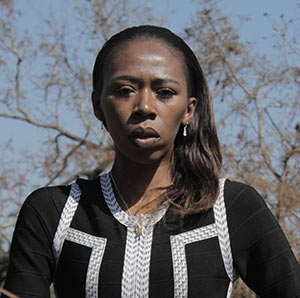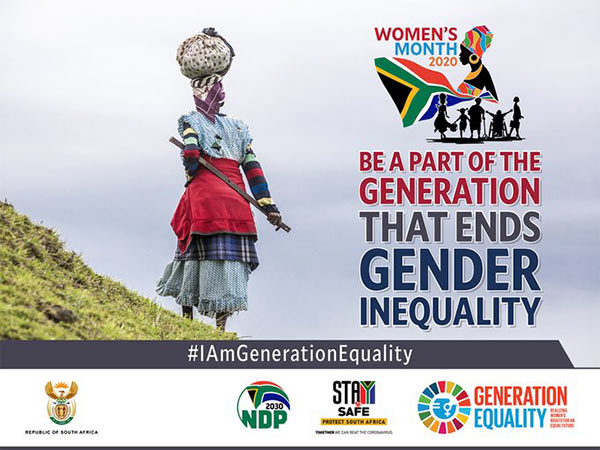College of Human Sciences
Raising female academic prowess is her passion

Lefatshe Moagi-Venter
Lefatshe Moagi-Venter, a lecturer from the Department of Political Sciences in the College of Human Sciences (CHS), has been nominated by Coracle Diagnostic Ltd, a technology company registered in the UK, to conduct research on the early detection of mental health problems focusing on the youth of South Africa during Covid-19.
The project aims to research and deliver high-impact, culturally appropriate interventions for youth mental health in the country.
"I am ecstatic that my academic and research work, particularly on youth, is being recognised around the world," says Moagi-Venter, who will represent Unisa and the Thabo Mbeki School of Public & International Affairs as part of its "South African Voices" project.
This acknowledgement, she says, "I owe to the work conducted on youth-related projects in SA, which includes mentorship programmes, hosting graduate seminars, assisting NGOs, and to the nomination I received from The Future Africa Awards in Nigeria. It was acknowledged in Africa dedicated to develop young people in the continent."
"It is an honour that a young female black academic is being recognised. This initiative boosts my confidence in the academic space with the hope of being rated as a National Research Foundation (NRF) researcher in South Africa," she adds.
Her focus as a leading researcher in qualitative methodology is to provide credible assessment. She will propose a research method that will provide credible data. This will add value and influence on policies concerning the mental health care of the South African youth. The project started in April 2020 and will run for approximately 24 months providing full support to future academics and researchers within the nine provinces.
"Not only is the university name benefiting from this project but a young girl from Mabopane is seeing herself collaborating with international institutions. This is beyond my wildest dreams."
Further engagement in social, political and psychological education
Moagi-Venter was approached by Coracle Diagnostic in response to her research scholarship received as a student at Syracuse University in June 2017. "I got a certificate in qualitative research methodology," she notes. Agreeing to be a leading researcher, she says it is because the topic fascinates her as it will allow for further engagement in social, political and psychological education.
Although Coracle Diagnostic leads the project, it is also partnered with organisations such as The Self Reliance Institute, NEDLAC Community Trust, Community Constituency SA and Afro Visionary Legacy. However, the funder of the project is Grand Challenges Canada’s Mental Health Programme.
Grand Challenges Canada’s Global Mental Health Programme is based in Toronto at the Sandra Rotman Centre, University Health Network. Their mission is to catalyse innovation that saves and improves lives of the most vulnerable in their country and low and middle-income countries. They bring a feminist approach to investment and are one of Canada’s largest impact-first investors, having supported over 1 000 innovations across 95 countries.
Women’s voices are silenced
According to Moagi-Venter, this international project and its collaborations will add value to her department’s gender transformation unit, an initiative she created for young female researchers. "My main interest has always been an establishment of such a platform in the Department of Political Sciences, as it was a concern of mine over the way women are excluded from the transformation agenda."
She emphasises: "We have insufficient practical examples of how much work is done by the university to address major issues that delay the academic and research capabilities of black women in the university."
"There are many challenging issues that women face, and delaying tactics done in order for them not to disclose their real experiences. As you note the project is entitled 'South African voices', yet many voices of women are being silenced and the silence comes with threats of their livelihoods."
Female researchers need access to resources within and outside the university
Moagi-Venter thinks that the project will also assist women who are unmotivated about the possibilities of achieving higher as independent researchers and it will elevate their academic prowess within higher education. "There are many loopholes within the overall 'university transformation policies' in assisting and developing future academics, hence my interest is to place a focus on mentoring and providing support for female researchers to have access to resources within and outside the university," she says.
Nonetheless, Moagi-Venter believes that there are programmes within the university that support the development of its academics. She says being a 2019 Young Academics Programme alumna gave her a career a boost. "The programme is an investment as it helped us to brand our profession and to be open to international market as academic researchers." She learnt how to handle pressures of being a professional academic within the higher education fraternity.
Lastly, Moagi-Venter thanks Unisans in the academic space who believed in her research abilities, namely, professors Edith Phaswana, Azwihangwisi Mavhandu-Mudzusi, and Esther Kibuka-Sebitosi, Dr KZ Moichela and Butholweze Mtombeni. "Their trust in my talent has motivated me to reach even higher pedestals in academia."
* By Lesego Ravhudzulo, Journalist, Department of Institutional Advancement
Dynamic Unisan among SA's most influential
Women more vulnerable than ever
GBV in South Africa, where are we going wrong?
Publish date: 2020/08/26


 Unisa co-hosts G20 community outreach in the Eastern Cape
Unisa co-hosts G20 community outreach in the Eastern Cape
 Unisans gain membership of prestigious science academies
Unisans gain membership of prestigious science academies
 Advocating for disability transformation through servant leadership
Advocating for disability transformation through servant leadership
 Unisa Press continues to illuminate the publishing space
Unisa Press continues to illuminate the publishing space